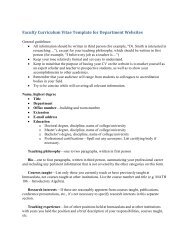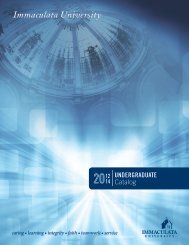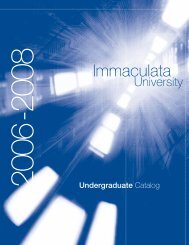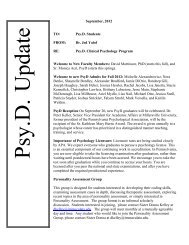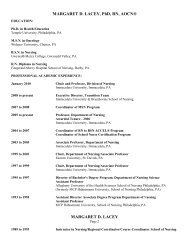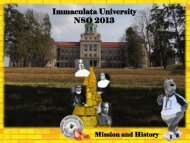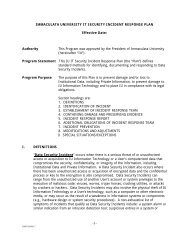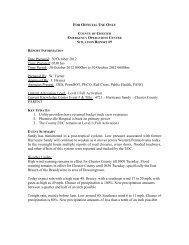Undergraduate Catalog 2008-2010 - Immaculata University
Undergraduate Catalog 2008-2010 - Immaculata University
Undergraduate Catalog 2008-2010 - Immaculata University
You also want an ePaper? Increase the reach of your titles
YUMPU automatically turns print PDFs into web optimized ePapers that Google loves.
Chemistry<br />
James K. Murray, Jr., Chair<br />
Kathryn A. Lysko<br />
Jiangyue (Luna) Zhang<br />
Sister Ann <strong>Immaculata</strong> Gallagher, Emerita<br />
OUTCOMES<br />
The Chemistry program offers courses which:<br />
• provide science majors with the required training for graduate<br />
study, medical school, careers in education and industrial<br />
research<br />
• provide a basic foundation in chemical concepts for liberal arts<br />
students, allied health science students, and nutrition majors<br />
• impart a basic understanding of the physical and chemical<br />
processes of living systems at the molecular level.<br />
REQUIREMENTS FOR MAJOR<br />
There are six tracks offered within the Department of Chemistry.<br />
Required courses for each track are listed below.<br />
• Chemistry (BS): CHE 103-104, 200, 211-212, 304, 313-314, 317,<br />
320, 330-331, 310/315/318, 350-351, 401-402, MATH 207-208, or<br />
301-302, PHY 203-204, PSY 208(Statistics).<br />
• Chemistry (BA): CHE 103-104, 200, 211-212, 304, 313-314,<br />
317, 320, 330, 310/315/318/331, 350-351, MATH 207-208 or 301-<br />
302, PHY 203-204, PSY 208 (Statistics).<br />
• Chemistry (BA) – Biology (BA): In addition to the courses listed<br />
above for the B.A. in Chemistry, the student must also take BIOL<br />
233, 234, 305, 306, 307, 308, and onefrom 310/323/335/365.<br />
• Chemistry (BA) with Secondary Education Certification: CHE<br />
103-104, 202, 211-212, 304, 313-314, 317; MATH 207-208 or 301-<br />
302; PHY 203-204; CIS 201/204/207.<br />
• Chemistry (BA) with Minor in Information Technology: CHE<br />
103-104, 200, 211-212, 313-314, and two upper division courses<br />
from the following: CHE 304/310/315/318/330; CIS 201-202/214,<br />
224, 230-231, 325, 335, and one semester of a Programming<br />
Language, MATH 216, 207/301 or 208/302, PHY 208.<br />
• Chemistry (BA) with Minor in Business: CHE 103-104, 200,<br />
211-212, 313-314, and two upper division courses from CHE<br />
304/310/315/318/330; ECO 203, 307, ACC 201, BUS 309, 311,<br />
315, 360, FIN 362, choose one of FIN 325/FIN 367, choose one of<br />
BUS 364/BUS 366, MATH 207-208 or 301-302.<br />
ENTRY REQUIREMENTS FOR<br />
CHEMISTRY MAJOR<br />
In order to enroll in the initial majors’ courses in the Chemistry<br />
Department, the following prerequisites must be met:<br />
• A grade of B or higher in a 1 year high school chemistry<br />
course (completed within the previous 5 years) or Grade of B<br />
or higher in CHEM 101-102, at <strong>Immaculata</strong> <strong>University</strong><br />
• Performance on <strong>Immaculata</strong> Mathematics Placement Test<br />
sufficient for admission to MATH 207-208 or a grade of B or<br />
higher in MATH 203-204, at <strong>Immaculata</strong> <strong>University</strong>It is<br />
possible to complete a course of study for a baccalaureate<br />
degree in chemistry in four years of normal full-time study<br />
from the time the specified prerequisites are met; students who<br />
need to take courses to meet the specified prerequisites may<br />
take longer.<br />
REQUIREMENTS FOR MINOR<br />
• Chemistry: CHE 103–104, CHE 211-212 and three upper division<br />
courses from the following: CHE 304, 310, 313, 314, 318, 320, 330<br />
• Mathematics: 207-208 or 301-302<br />
REQUIREMENTS FOR PREPROFESSIONAL<br />
PROGRAM FOR MEDICAL SCIENCES<br />
Students preparing for a career in medicine, dentistry, optometry,<br />
podiatry, or veterinary medicine will complete the following<br />
professional school requirements: BIOL 234, 306; CHE 103-104,<br />
211-212; PHY 203-204; and MATH 207-208 or 301-302.<br />
Participation in Preprofessional Internship (SCI 351-352) is<br />
recommended. Academic advisement for this program is provided<br />
by the Advisory Committee for the Health Professions.<br />
POLICY ON FORMAL ACCEPTANCE IN A<br />
CHEMISTRY MAJOR<br />
Formal acceptance into a baccalaureate major is generally made<br />
when a student has completed the first semester of sophomore year<br />
(45 credits). This confirms that a student is sufficiently prepared for<br />
the rigors of upper-level undergraduate study in that major.<br />
Students must meet the formal acceptance requirements for the<br />
major before they will be permitted to continue in the major.<br />
Full-time students who enroll in one of these majors in the first<br />
semester of their first year can complete all of the requirements for<br />
formal acceptance in two years provided they maintain satisfactory<br />
performance in all courses. Students who are not on the scheduled<br />
sequence of courses for reasons such as: transfer, deferment, change<br />
of major, repeating courses, etc will take longer to complete the<br />
degree requirements for graduation.<br />
REQUIREMENTS FOR FORMAL ACCEPTANCE<br />
In order to be formally accepted into a major, students must:<br />
1. Attain at least 45 credits by the end of the first semester of<br />
sophomore year with a minimum overall GPA of 3.0*<br />
2. Maintain a minimum GPA of 3.0 averaged over the following<br />
courses or accepted equivalents: CHE 103-104, CHE 211-212,<br />
and MATH 207-208 or 301-302.<br />
* Minimum GPA of 3.0 is required if also seeking secondary<br />
education certification.<br />
Note: To continue in the program, chemistry majors must earn a<br />
grade of C (2.0) or higher in all college mathematics and science<br />
courses taken to fulfill major requirements.<br />
CHE 100 Survey of Chemistry (4)<br />
A survey of general, organic, and biochemistry with emphasis on<br />
basic chemical concepts and the relationships among these three<br />
branches. 3 hours lecture, 2 hours laboratory.<br />
CHE 101 Basic College Chemistry I (3)<br />
A basic course in the fundamental laws, theories, and<br />
experimental techniques of chemistry and the application of<br />
chemistry to relevant societal concerns. (Fulfills core requirement.)<br />
2 hours lecture, 2 hours laboratory.<br />
CHE 102 Basic College Chemistry II (3)<br />
A continuation of CHE 101, continuing the study of the<br />
fundamental laws, theories, and experimental techniques of<br />
chemistry and the application of chemistry to relevant societal<br />
concerns. (Fulfills core requirement.) 2 hours lecture, 2 hours<br />
laboratory. (Prerequisite: CHE 101)<br />
52




